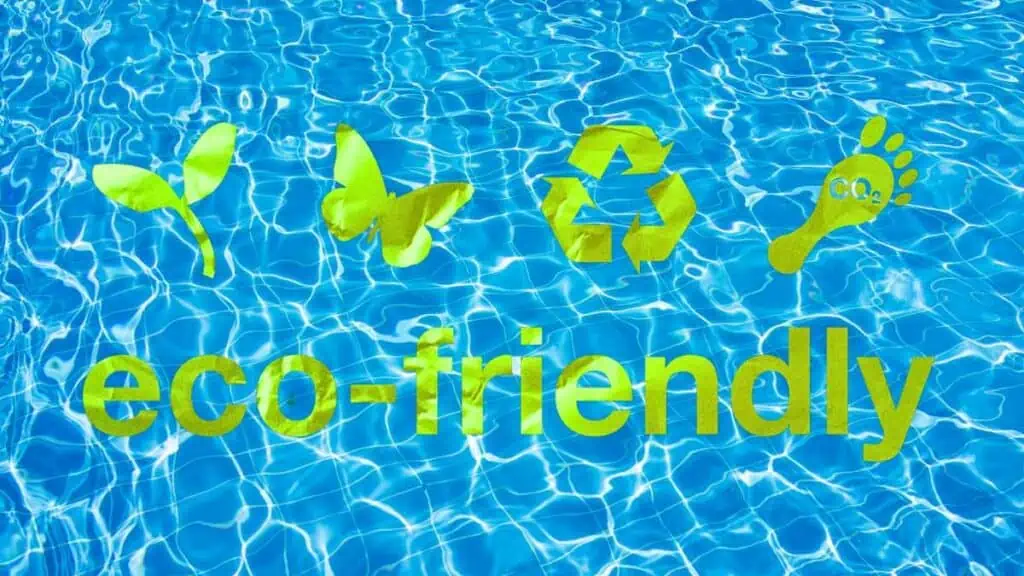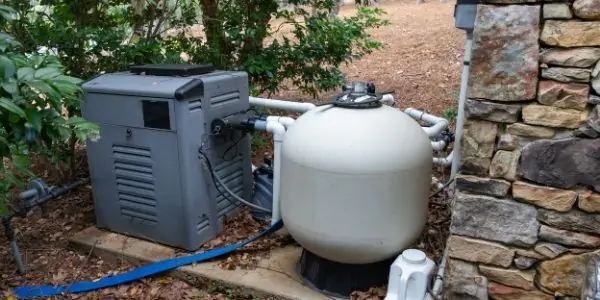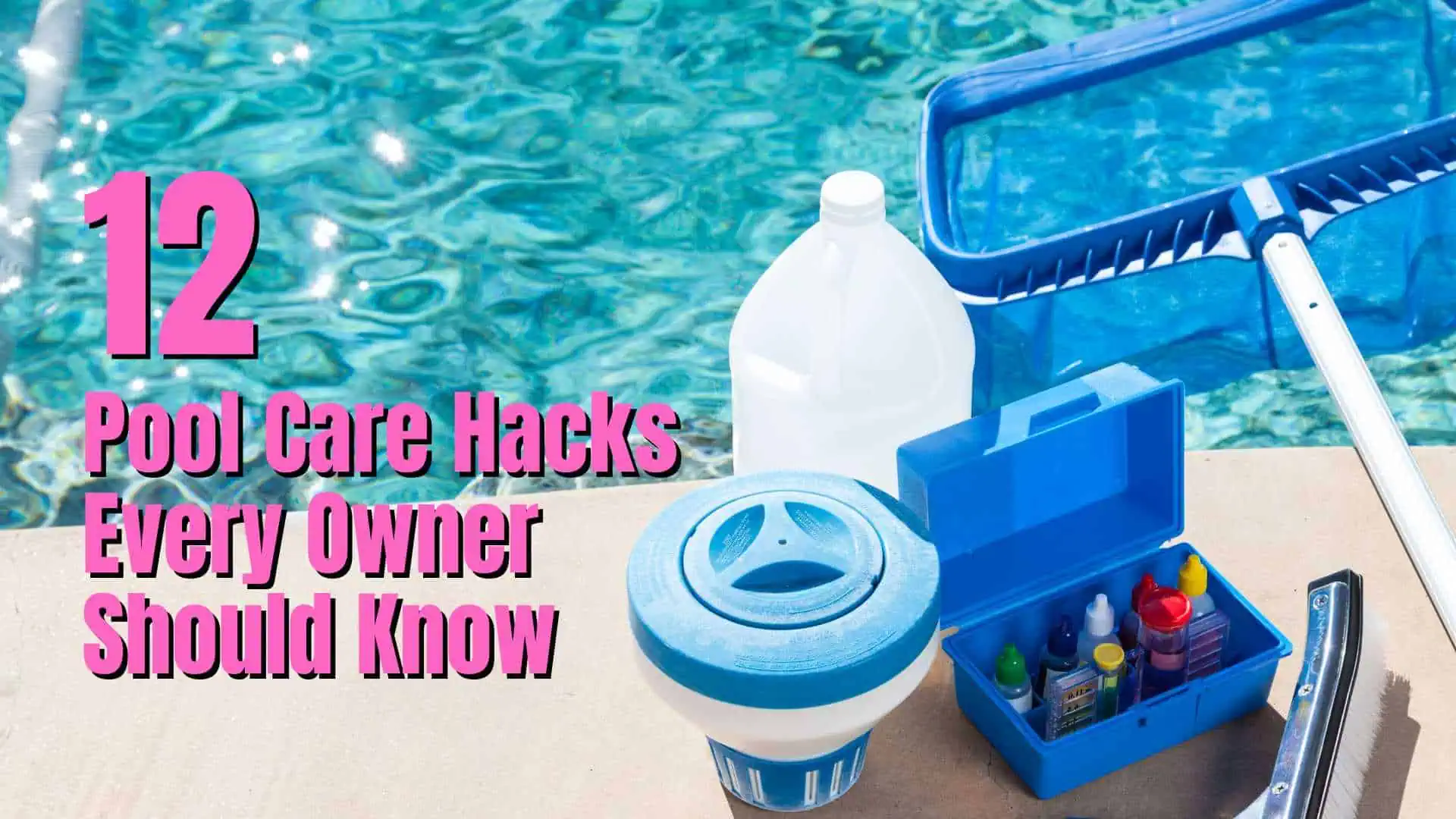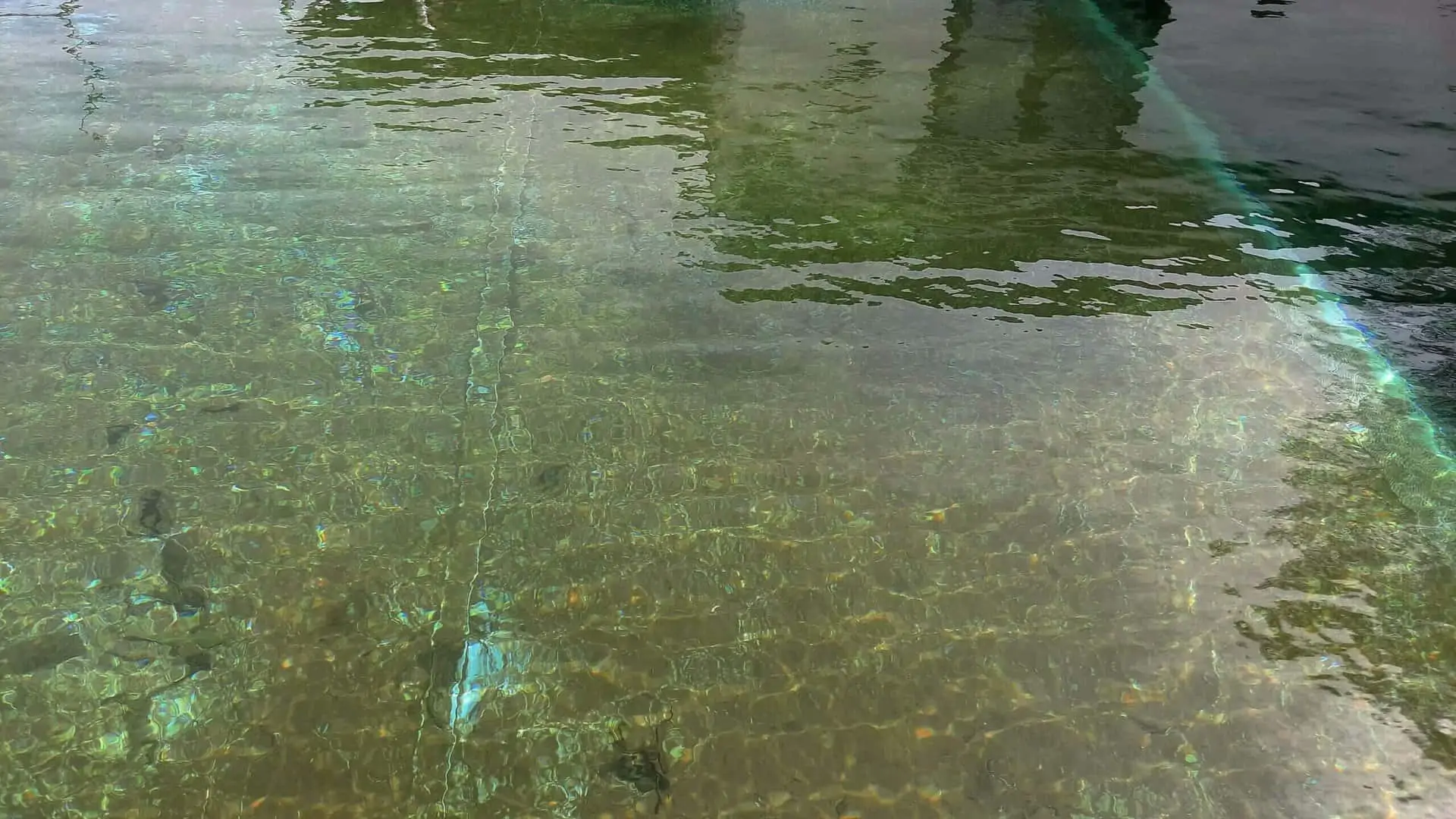Going Green with Pool Maintenance
Going green with your pool maintenance can benefit the environment, your wallet, and your health.
Traditional pool care often involves using large quantities of chemicals that can harm our environment. However, adopting a greener approach to pool maintenance doesn’t mean you’ll have to compromise on enjoying a clean and safe swimming space.
I show the advantages of an environmentally friendly pool and how minimizing your pool’s ecological footprint can contribute positively to your pool ownership experience. I’ll explore alternative cleaning methods, eco-friendly equipment, and the use of less harmful products.

Are Pools Bad for The Environment?
Swimming pools, particularly their maintenance, can negatively impact the environment if not managed sustainably.
Traditional pool care often requires significant amounts of water, energy, and chemicals. Pool water evaporation can lead to high water usage, especially in warmer climates, while pool heating systems can consume large amounts of energy.
Additionally, the chemicals often used to maintain pools, such as chlorine, can contaminate surrounding soil and groundwater if not handled correctly.
However, it’s worth noting that increasingly many sustainable practices and technologies are being adopted in pool maintenance, such as pool covers to reduce evaporation, solar-powered heaters, and using saltwater or UV systems as alternatives to harsh chemicals.
While pools can have environmental drawbacks, there are ways to mitigate these effects and make your pool more eco-friendly.
Benefits of Eco-friendly Pool Care
By transitioning to eco-friendly pool maintenance methods, you significantly reduce your pool’s impact on the environment with sustainable pool cleaning while also enjoying a number of benefits.
- Cost savings: Eco-friendly pool maintenance often involves less water and energy, resulting in lower utility bills. Additionally, natural cleaning alternatives, like vinegar, tend to be less expensive than their commercial chemical counterparts.
- Healthier water: Some eco-friendly pool care methods like sphagnum moss can help improve water quality while reducing the need for harsh chemicals like chlorine. This can result in an overall healthier swimming experience as it can be gentle on your skin, hair, and eyes.
- Reduced carbon footprint: By embracing eco-friendly pool care habits, you contribute to preserving the environment. Lower water consumption, energy usage, and reduced chemical waste contribute to a smaller carbon footprint and healthier planet.
Eco Friendly Pool Chemicals
It isn’t easy to have a chemical-free pool unless you opt to have one of the natural pool ponds that are slowly becoming popular.
However, maintaining an eco-friendly swimming pool is possible when you incorporate green solutions into your regular pool maintenance routine. Let’s talk about some eco-friendly pool chemicals that will help you keep your pool clean and clear while being kind to the environment.
First, consider reducing your chlorine usage. Chlorine is the most common pool chemical, but it can be harmful to the environment and your skin.
You can still maintain proper chlorine levels to keep algae at bay, but there are ways to use less of it. One popular method is to add a mineral treatment to your pool, which helps suppress algae growth, allowing you to use less chlorine.
Products like Pool Frog, Nature2, and Pool Rx are great options for mineral purification.
Bromine is another alternative for sanitization – it’s not as harsh as chlorine and is less likely to cause skin irritation. Additionally, bromine is more stable at higher temperatures, making it an excellent choice for hot tubs or heated pools.
Switching to a biguanide system is another option for eco-friendly pool maintenance. Biguanides are chlorine-free and gentle on the skin, eyes, and environment. This makes them a popular choice for health-conscious and environmentally-aware pool owners.
Incorporating an ozone generator into your pool system can also help reduce chemical usage. Ozone is a powerful oxidizer, which means it breaks down organic matter in the pool, allowing you to use fewer chemicals like chlorine or bromine. Plus, ozone leaves virtually no residue and has no negative impact on the environment!
Greener Sanitation Methods
With the growing concern for the environment, you might want to consider alternative, eco-friendly ways to sanitize your pool water. These are the various options available that effectively keep your pool clean without relying heavily on traditional chemicals.
Saltwater Systems are becoming increasingly popular as an alternative to using large amounts of chlorine. In a saltwater pool, you add salt directly to the water, which then undergoes electrolysis to produce chlorine.
This process continuously regenerates, requiring less maintenance and reducing the need for additional chemicals. It’s also gentler on your skin and eyes.
I have recently converted my pool to saltwater, and it is going very well. At this point, it has been installed for 3 months and I have had to add no salt (or chlorine obviously) as the chlorine levels are spot on.
UV Sterilizers employ ultraviolet light to neutralize bacteria, viruses, algae, and other microorganisms. It’s a non-chemical method that works in conjunction with your pool’s filter system.
While you’ll still need minimal sanitizer, UV sterilizers significantly reduce the required quantities, making your pool more eco-friendly.
Ozone Systems use ozone gas to oxidize organic contaminants and break down bacteria. Again, this method isn’t a standalone solution but can drastically cut down on the use of chemicals like chlorine.
Combining UV and Ozone systems allows you to create Hydroxy Radicals (AOP – Advanced Oxidation Process), a powerful and environmentally friendly sanitizer.
Enzyme Products are natural, biodegradable substances that serve as supplemental sanitizers. They break down non-living organic materials such as body oils, sunscreen, and sweat.
Though enzymes aren’t a replacement for sanitizers like chlorine or bromine, they do help to reduce their demand, making it easier to maintain a clean and eco-friendly pool.
Efficient Pool Water Filtration

Having an eco-friendly pool means efficiently filtering your pool water. The type of filter you choose greatly impacts the overall energy consumption and water quality of your pool. Let’s discuss the most common types of pool filters and how they contribute to a greener pool.
Cartridge filters are an excellent choice for eco-friendly pool maintenance. These filters use a replaceable cartridge made of polyester or another synthetic fabric that catches debris and impurities.
Cartridge filters are very energy efficient, as they have a lower flow rate and require less pressure than other filter types. The cartridges can be cleaned and reused multiple times, reducing waste and saving you money.
Sand filters use a bed of sand to trap dirt and debris as water flows through it. While sand filters may not be as energy-efficient as cartridge filters, they still offer some eco-friendly benefits. First and foremost, they require less maintenance and can last several years before needing replacement.
Additionally, sand naturally filters water through its granular structure, meaning fewer chemicals are needed to maintain clean water.
Regardless of the filter type you choose, follow these simple tips to keep it running efficiently and contributing to an eco-friendly pool:
- Maintain your filter regularly: Cleaning and replacing cartridges, backwashing sand filters, and inspecting your filter system to ensure it’s working effectively and not wasting energy.
- Select the right filter size: Having a filter with the appropriate capacity for the size of your pool helps cut down on energy usage and ensures the water stays clean.
- Use a timer: Installing a timer can help control the pump and filter system, cutting down on energy use when they’re not needed, such as during off-peak hours.
Pool Cleaning without the Chemicals
Having an eco-friendly pool is not only great for the environment, but it’s also kinder to your skin since fewer chemicals are involved.
To help maintain an eco pool, follow these tips to help reduce the amount of chemicals needed:
- First and foremost, invest in an energy-efficient robotic pool cleaner. These automated devices work independently from your pool’s filtration system, consuming less power and reducing the need for harsh chemicals. Additionally, robotic pool cleaners are excellent at removing dirt, debris, body oil, and sunscreen from your pool’s surfaces. In time, this can significantly cut down on your chemical usage.
- Brushing your pool walls and floor regularly is another way to maintain a clean pool without relying on chemicals. By giving your pool a good scrub, you’ll effectively remove algae and prevent the need for excessive chemical treatments. Just grab your pool brush, and habitually clean these surfaces once a week.
- Frequent pool skimmers and filters maintenance is necessary for proper circulation and filtration. Clean skimmers and filters help catch debris and prevent algae growth in your pool. Remember to backwash your sand filter periodically for a couple of minutes to keep it in optimal working condition.
- Consider utilizing alternative sanitizing methods, such as ozonation or ionization systems. Ozonation systems allow you to run your pool without any need for chlorine, though you might need to add a chlorine-free algaecide. Ionization systems can be a bit pricey but are highly effective for keeping your pool clean without the use of chemicals.
- Lastly, encourage pool users to shower beforehand to reduce the introduction of body oil, sunscreen, and other contaminants. This simple step will go a long way in keeping your pool cleaner and preserving water quality.
Energy-efficient Pool Equipment
Upgrading to energy-efficient pool equipment is a great way to make your pool more eco-friendly and reduce energy consumption.
One significant component to consider is a variable speed pump. Unlike single-speed pumps, variable speed pumps allow you to adjust the speed to the optimal level, reducing the amount of electricity needed to circulate water.
Investing in an eco-friendly pool pump can be another helpful solution. These pumps are designed to work efficiently, use less energy, and create minimal noise pollution. You’ll save on your electricity bill and enjoy a more peaceful backyard environment.
Consider implementing a pool pump timer to exert better control over your pump’s energy usage. It is hard to believe that not every pool has one, but many do not.
With a timer, you can schedule periods when the pump runs at lower speeds or is turned off entirely – such as during non-peak swimming hours. This ensures your pump isn’t using unnecessary energy when it’s not needed.
Solar Options for Swimming Pools
Solar energy is an excellent eco-friendly option for maintaining your swimming pool. By harnessing the power of the sun, you can reduce both your energy costs and environmental impact.
I have solar heating panels on the roof of my house. These and my solar pool cover extend my swimming season by more than a month.
Solar Heating
One green solution to consider is investing in solar pool heaters. These heaters use solar panels to pump pool water through which heats the pool water.
Solar pool heaters have minimal annual operating costs so they are very low-cost compared with gas and heat pump pool heaters.
Once you have installed one, you effectively have free heat as long as you have sun. Your electricity bills remain the same as your pool pump pushes the water around the solar panels when on its normal filter cycle (which must be when it is sunny obviously).
The best solar pool heaters in 2023 include great options like Smart Pool S601 Sun Heater and SOLAR POOL SUPPLY SwimEasy TT Solar Pool Heater DIY Kit.
I have an old solar heating system that was installed on the roof when we purchased the house 10 years ago. Apart from a few very small repairs it continues to work and extends our swimming season by between 6 and 8 weeks.
Solar Pool Covers
Solar pool covers help maintain a pristine pool environment and save you money in the long run.
- Save water and reduce evaporation: Water evaporation is a significant issue for swimming pools, leading to water loss and increasing water usage.
Installing an eco-friendly pool cover can reduce water evaporation by up to 95%. This not only saves water resources but also lowers your water bill.
Since evaporation is a major source of heat loss, stopping evaporation greatly helps to retain heat.
- Heat retention: Eco-friendly pool covers capture the sun’s heat and transfer it into the water. This helps maintain a comfortable pool temperature, reducing the need for additional pool heating.
A good pool cover can maintain the water temperature at a steady 10–15 degrees above air temperature, meaning you’ll save energy and have a warm pool for you and your family to enjoy!
- Decrease chemical usage: Using a pool cover helps reduce the chemicals needed to keep your swimming pool clean and balanced.
This reduction in chemical consumption can be anywhere between 35%–60%, meaning fewer chemicals are released into the environment, and you save money on chemical expenses.
I am now on my second solar pool cover. The first one lasted just over four seasons; my latest one is still going strong after five years.
Read: Do Solar Pool Covers Work? 19 Things to Know Before You Buy
LED Pool Lights for Lower Energy Use
Switching to LED pool lights is a great step towards making your pool more eco-friendly. Not only do they consume less energy, but they also last longer than traditional incandescent or halogen pool lights. This means you’ll use less electricity and reduce your overall environmental impact.
LED pool lights offer a brighter and more visually appealing experience, similar to comparing a standard-definition television to a high-definition one. The colors appear stronger and more vibrant, which can enhance the overall atmosphere of your pool area.
Another advantage of LED pool lights is their eco-friendliness. They use up to 89% less electricity than incandescent and halogen pool lights, which can significantly reduce your monthly pool electricity usage. They’re more durable and require less maintenance, saving you time and resources.
IntelliBrite 5G from Pentair
These underwater color LED pool lights are energy efficient and come with a custom reflector and innovative lens design. You can choose from five fixed colors (blue, green, magenta, white, and red) or seven pre-programmed “color shows.” Additionally, the pool lens can be rotated 180 degrees to provide either a wide or narrow beam pattern.
One of the drawbacks of LED lights is the cost. They cost many times more than a standard light – although they cost no more, or even significantly less, to manufacture. They last so much longer that manufacturers hike the price to compensate for lost future revenue.
When one of my standard lights stopped working, I bought two LED lights to replace both, at great expense. After fitting them, I had one of my “how stupid are you” moments when I realized that in 10 years I have perhaps turned the lights on 5 or 6 times. It will take me about a million years to get my money back in reduced energy costs!
Read: LED Pool Lighting – Are LED Pool Lights Worth Installing?
Eco-friendly Pool FAQs
What are some green solutions for pool maintenance?
Some green solutions include using pool covers to reduce water evaporation, installing energy-efficient equipment, using solar heating, and adopting chemical alternatives like saltwater or UV systems.
How can I reduce water usage in my pool?
Utilize a pool cover when the pool is not in use to minimize evaporation. Additionally, regularly check and repair any leaks to prevent unnecessary water loss.
Are there eco-friendly alternatives to traditional pool chemicals?
Yes, alternatives like saltwater systems, UV sanitation systems, or mineral purifiers can reduce the need for harsh chemicals and are gentler for the environment.
How can energy consumption be minimized in pool maintenance?
Using energy-efficient pumps and heaters, setting appropriate pump operation times, and considering solar heaters can significantly reduce energy usage.

I have had hot tubs for over 20 years and a pool for the last 10 years. I had to learn how to clean, maintain and fix them the hard way. Since then I have helped many friends and neighbors with their pools and now I want to share everything I have learned with you. About Me






